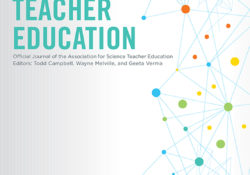eric.ed.gov har udgivet: The intent of this qualitative study was to examine pre-service teachers’ growing awareness of the role dispositions and autonomy play in the classroom and the implications these constructs have for teaching and learning. Teacher candidates’ written reflections and focus group statements revealed three robust emergent themes: engagement, empowerment, and meaning making. When taking a wide lens view, these robust emergent themes nurtured certain dispositions, autonomy, and teaching efficacy. Teaching strategies such as the project approach (adult-oriented and with children) and the construction of math games were considered valuable assignments that strengthened a variety of dispositions by providing on-going opportunities for teacher candidates to engage in experiences that promoted autonomous thinking and actions during their preparation program. Teaching efficacy emerged as a related construct and became an integral… Continue Reading →
Like this:
Like Loading...

tandfonline.com har udgivet en rapport under søgningen “Teacher Education Mathematics”: ABSTRACT ABSTRACT Teacher-directed and inquiry-based science instructional practices have been shown to influence students’ performance on science assessments. However, only a small body of research has examined the associations of teacher-directed and inquiry-based science instructional practices with science-related dispositions among adolescent students using nationally representative samples drawn from countries across the globe. Hence, the present study, employing multilevel path analyses as an analytic strategy, investigated the relations of teacher-directed and inquiry-based science instruction to students’ science-related dispositions, such as enjoyment of science, interest in broad science topics, instrumental motivation to learn science, science self-efficacy, and epistemological beliefs about science, among 428,197 adolescent students from 15,644 schools in 66 countries. Results of multilevel path analyses, after controlling for student-, school-, and… Continue Reading →
Like this:
Like Loading...
tandfonline.com har udgivet en rapport under søgningen “Teacher Education Mathematics”: ABSTRACT ABSTRACT Mathematics competency is fast becoming an essential requirement in ever greater parts of day-to-day work and life. Thus, creating strategies for improving mathematics learning in students is a major goal of education research. However, doing so requires an ability to look at many aspects of mathematics learning, such as demographics and psychological dispositions, in an integrated way as part of the same system. Large-scale assessments such as the Programme for International Student Assessment (PISA) provide an accessible and large volume of coherent data, and this gives researchers the opportunity to employ data-driven approaches to gain an overview of the system. For these reasons, we have used machine learning to explore the relationships between psychological dispositions and mathematical literacy… Continue Reading →
Like this:
Like Loading...
eric.ed.gov har udgivet: In this paper, I argue that the establishment of after-school mathematics clubs in early grades holds rich potential for supporting the development of increasingly participatory and sensemaking maths learning dispositions. Within the South African Numeracy Chair project, lead by the author, multiple after-school mathematics clubs have been set up for learners in Grades 3-6 across Eastern Cape schools. These clubs are a complementary initiative to teacher development, aimed at improving low levels of numeracy learning across the majority of schools in the province. Two sources of data, learner interviews and teacher questionnaires, from one case study club, are shared in this article to illuminate the potential such clubs hold in developing increasingly participatory mathematics learning dispositions. Link til kilde
Like this:
Like Loading...

